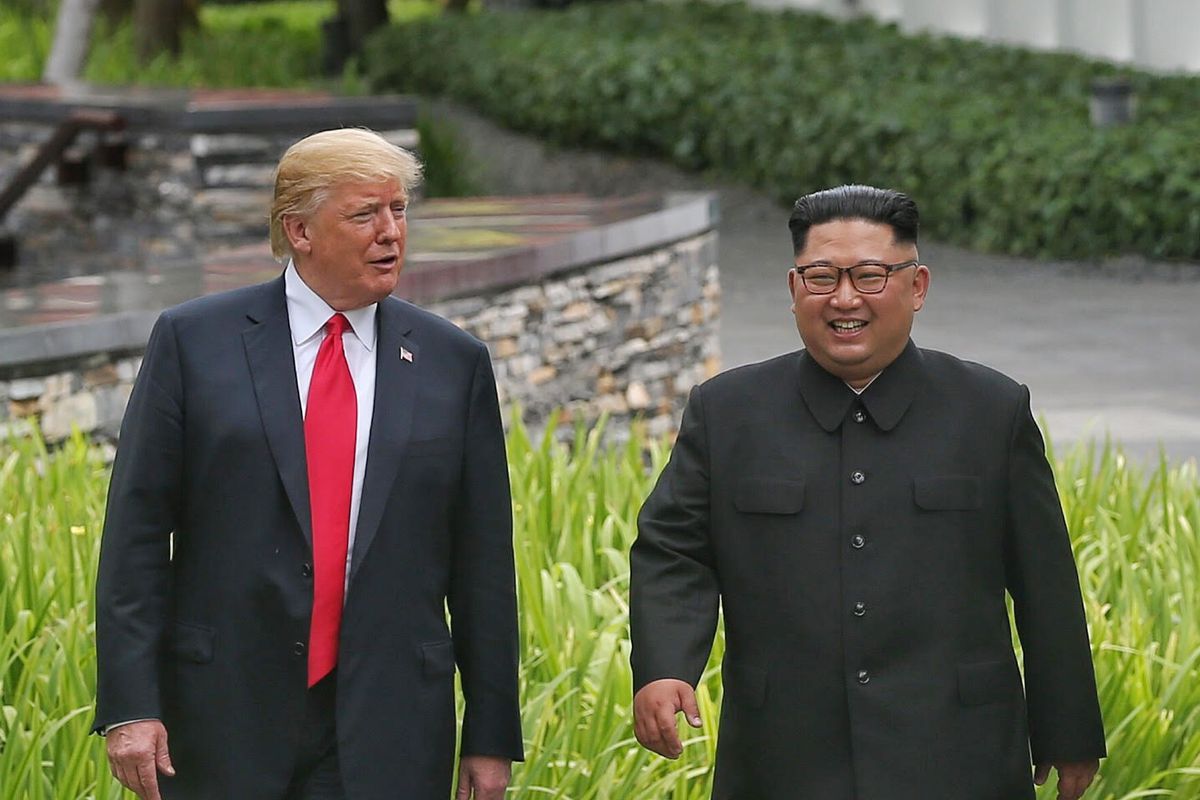
U.S. President Donald Trump and North Korean leader Kim Jong Un take a stroll during their June 12th Singapore summit. Photo courtesy of Kevin Lim/The Strait Times/Handout/Getty Images
As Washington is currently full of armchair quarterbacking in the wake of the historic Trump-Kim summit in Singapore, perhaps a more unorthodox and pragmatic, less idealogical quarterback was what was needed to finally move the ball (back) up the field of U.S.-DPRK relations.
Despite the warm smiles and gestures proffered during the recent, historic Singapore summit between the U.S. and the DPRK, there remains an air of continuing mistrust between the two states. This is because both states have been at this very same juncture before, only to have progress stymied because of mistrust and deception on both sides. A key component of previous difficulties had been the hesitancy of previous U.S. presidents in granting a diplomatic audience to the DPRK in the first place in the belief that solely being able to meet with the U.S. president is a concession in and of itself and that the DPRK should be grateful that its stature would be raised accordingly.
Another key component of previous difficulties has been the notion of reciprocity, or more accurately, the perceived lack thereof. Previous U.S. administrations have held firm to the belief that the DPRK must agree to a complete, verifiable, irreversable denuclearization (CVID) of the Korean Peninsula first before any true negotiations with the U.S. could start. Or, to re-phrase it, “Surrender first, then we’ll talk.”
Because of domestic backlash, even this stance has been walked back post-summit to that of the U.S. demanding that CVID of only the DPRK (as opposed to the entire Korean Peninsula, which would include U.S. nuclear weaponry) must be done before sanctions are totally lifted and U.S.-ROK military exercises are totally halted. Despite the previous U.S. insistence that withdrawal of U.S. troops from the Korean peninsula is not a negotiating point and would be a matter of joint discussion with the ROK, some media pundits and politicians are trying to use the fear of even this remote possibility, in the wake of President Trump’s surprise statement regarding U.S.-ROK military exercises, as further ammunition in their quest to discredit the president, and thereby sabotage negotiations.
What’s still not clear is the extent to which the president is proposing halting U.S.-ROK joint military exercises. What is clear, however, is that previous negotiating tactics with the DPRK clearly were not working and a drastic change in approach was necessary. The extent to which the president’s method was influenced by China’s “double freeze” proposal or his own instincts will be a subject of further debate. What’s also clear is that serious diplomacy is much more preferable than simply walking up to the DMZ in a cute bomber jacket and looking through binoculars at the very adversary you should be talking to. Also, ignoring your adversary’s sister at the Winter Olympics doesn’t win you any points with anyone…anywhere.
To cut to the chase, no one actually knows Trump’s strategy, or if he even has one or not. This is not only confined to the DPRK issue, but also encompasses U.S.-China trade, U.S.-EU relations, Syria, and much, much more! Anyone in Washington (or elsewhere) claiming they have a bead on the president because they’ve read Trump: The Art of the Deal is disengenous. As many times as Trump has shifted his thinking over the course of a week (or day), surely perhaps his thinking has shifted slightly over the course of the last generation, as the book was originally published over 30 years ago. The year 1987 can not even hold a candle to today’s increasingly frenetic multipolar world. This is one of the reasons why the DPRK held talks with China, the ROK, and Russia, before deciding to “raise its stature” by then holding direct talks with the U.S..
In Ronan Farrow’s War on Peace: The End of Diplomacy and the Decline of American Influence, the author decries the steady atrophying of the U.S.’ diplomatic game over the course of several U.S. administrations. The reasons are multiple, ranging from still-unfilled vacancies of the upper management echelons at the State Department, to the gradual assumption by the military and intelligence community of roles formerly performed by State. The book posits that this is by presidential design, but if so, still lacks concrete answers as to exactly why.
Whether it’s an attempt by Trump to further marginalize professional expertise in favor of asserting a more dominant role for himself in U.S. foreign policy formulation is anybody’s guess. Perhaps it’s an attempt to clean out schlerotic, Cold War thinking (“The Blob”) in favor of a new approach. If so, then this new dynamic, out-of-the-box thinking is desperately needed on other issues as well. The possible upcoming summit with Russian President Putin comes to mind, especially in the wake of Trump’s recent comments regarding Crimea. Let’s hope that “The Blob” heeds the advice of one analyst who recently stated, “A summit is not a wrestling match”. Very wise. Very wise indeed.